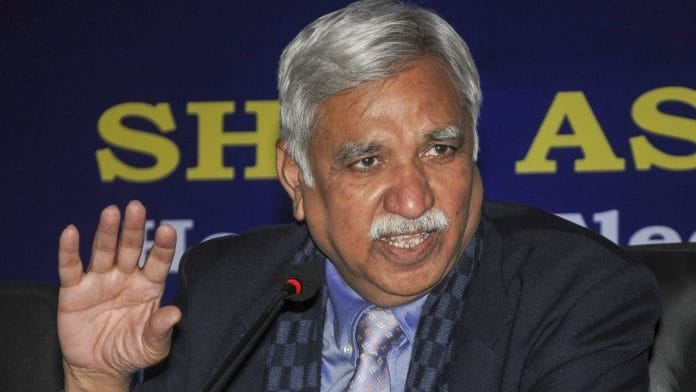New Delhi: The Election Commission (EC) is all set to approach the law ministry with a fresh pitch for long-sought electoral reforms, including allowing each candidate to contest only one seat and amending the cut-off date for voter enrolment.
According to EC officials, the commission is set to meet the new law secretary, Anoop Kumar Mendiratta, after the ongoing Parliament session ends next month, and brief him about the several electoral reforms pending with the government
The reforms include an amendment in the cut-off date for voter enrolment. As of now, only those who turn 18 on 1 January can vote in an election in that particular year, but the EC wants to allow four cut-off dates — 1 January, 1 April, 1 July and 1 October. If youngsters attain majority by any of these dates, the EC wants them to be able to cast votes in elections that follow.
The commission also wants to restrict the number of seats from which a candidate can contest elections. Currently, each candidate can contest elections from two seats, but the EC wants this to be brought down to one. If a candidate wins two seats, one of them has to go for bypolls, which means an additional expense for the poll panel. It has thus proposed a fine — commensurate with the poll panel’s expense on bypolls — for candidates who contest from two seats.
Also read: BJP wanted more anonymity for electoral bonds, had advised against invisible serial number
EC had written to law ministry
The EC had last written to the law ministry regarding the pending reforms on 2 September.
While the focus of that communication was the extension of alternative voting methods like postal ballot to persons involved in essential services, the disabled and the aged — a proposal that was subsequently accepted by the government — the commission had also reiterated other pending reforms.
The EC has decided to implement the alternative voting facility for the aged and disabled on a pilot basis in the upcoming Jharkhand polls, but the provision is still being fleshed out for those in essential services such as the transport and medical sectors, and media personnel involved in election coverage, among others.
Also read: How Modi govt quietly dropped proposal for public consultation on electoral bonds
Constitutional protection for other commissioners
Among the reforms reiterated by the EC in its September communication are providing constitutional protection enjoyed by the chief election commissioner to other election commissioners, establishing an independent secretariat for the EC like for the Lok Sabha and Rajya Sabha, financial freedom for the EC by way of its budget being charged to the Consolidated Fund of India, among others.
The EC also reiterated its earlier proposal of making paid news and filing false affidavits an electoral offence with punishment of two years imprisonment.
“If a candidate files false affidavit, or does not file the affidavit in the prescribed manner, there is no provision specifying this as a ground to challenge the election if such a candidate goes on to win the election,” the reiteration states.
Chief Election Commissioner Sunil Arora had written to Law Minister Ravi Shankar Prasad in July this year, and the Commission is now all set to make a fresh pitch for the reforms he recommended in the letter dated 27 July.
“The commission may also deliberate on more reforms that may be needed post the Jharkhand elections,” a senior EC official said.
Also read: Electoral bonds will undo demonetisation success, RBI Governor Urjit Patel told Arun Jaitley






